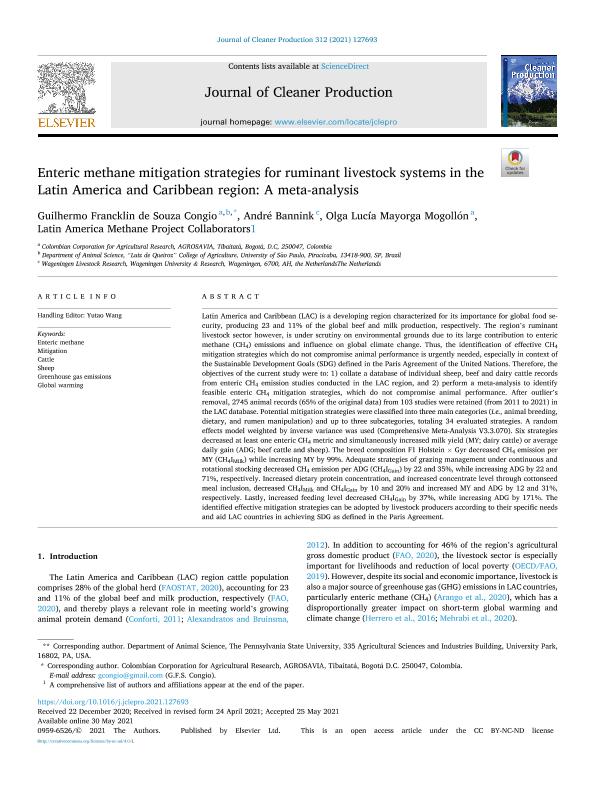Artículo
Enteric methane mitigation strategies for ruminant livestock systems in the Latin America and Caribbean region: A meta-analysis
Congio, Guilhermo Francklin de Souza; Bannink, André; Mayorga Mogollón, Olga Lucía; Jaurena, Gustavo; Gonda, Horacio Leandro; Gere, José Ignacio ; Cerón Cucchi, María Esperanza
; Cerón Cucchi, María Esperanza ; Ortiz Chura, Abimael
; Ortiz Chura, Abimael ; Tieri, María Paz; Hernandez, Olegario; Ricci, Patricia
; Tieri, María Paz; Hernandez, Olegario; Ricci, Patricia ; Juliarena, María Paula
; Juliarena, María Paula ; Lombardi, Banira
; Lombardi, Banira ; Abdalla, Adibe Luiz; Abdalla Filho, Adibe Luiz; Berndt, Alexandre; Oliveira, Patrícia Perondi Anchão; Henrique, Fábio Luis; Monteiro, Alda Lúcia Gomes; Borges, Luiza Ilha; Ribeiro Filho, Henrique Mendonça Nunes; Ribeiro Pereira, Luiz Gustavo; Tomich, Thierry Ribeiro; Campos, Mariana Magalhães; Machado, Fernanda Samarini; Marcondes, Marcos Inácio; Mercadante, Maria Eugênia Zerlotti; Sakamoto, Leandro Sannomiya; Albuquerque, Lucia Galvão; Carvalho, Paulo César de Faccio; Hristov, Alexander Nikolov
; Abdalla, Adibe Luiz; Abdalla Filho, Adibe Luiz; Berndt, Alexandre; Oliveira, Patrícia Perondi Anchão; Henrique, Fábio Luis; Monteiro, Alda Lúcia Gomes; Borges, Luiza Ilha; Ribeiro Filho, Henrique Mendonça Nunes; Ribeiro Pereira, Luiz Gustavo; Tomich, Thierry Ribeiro; Campos, Mariana Magalhães; Machado, Fernanda Samarini; Marcondes, Marcos Inácio; Mercadante, Maria Eugênia Zerlotti; Sakamoto, Leandro Sannomiya; Albuquerque, Lucia Galvão; Carvalho, Paulo César de Faccio; Hristov, Alexander Nikolov
 ; Cerón Cucchi, María Esperanza
; Cerón Cucchi, María Esperanza ; Ortiz Chura, Abimael
; Ortiz Chura, Abimael ; Tieri, María Paz; Hernandez, Olegario; Ricci, Patricia
; Tieri, María Paz; Hernandez, Olegario; Ricci, Patricia ; Juliarena, María Paula
; Juliarena, María Paula ; Lombardi, Banira
; Lombardi, Banira ; Abdalla, Adibe Luiz; Abdalla Filho, Adibe Luiz; Berndt, Alexandre; Oliveira, Patrícia Perondi Anchão; Henrique, Fábio Luis; Monteiro, Alda Lúcia Gomes; Borges, Luiza Ilha; Ribeiro Filho, Henrique Mendonça Nunes; Ribeiro Pereira, Luiz Gustavo; Tomich, Thierry Ribeiro; Campos, Mariana Magalhães; Machado, Fernanda Samarini; Marcondes, Marcos Inácio; Mercadante, Maria Eugênia Zerlotti; Sakamoto, Leandro Sannomiya; Albuquerque, Lucia Galvão; Carvalho, Paulo César de Faccio; Hristov, Alexander Nikolov
; Abdalla, Adibe Luiz; Abdalla Filho, Adibe Luiz; Berndt, Alexandre; Oliveira, Patrícia Perondi Anchão; Henrique, Fábio Luis; Monteiro, Alda Lúcia Gomes; Borges, Luiza Ilha; Ribeiro Filho, Henrique Mendonça Nunes; Ribeiro Pereira, Luiz Gustavo; Tomich, Thierry Ribeiro; Campos, Mariana Magalhães; Machado, Fernanda Samarini; Marcondes, Marcos Inácio; Mercadante, Maria Eugênia Zerlotti; Sakamoto, Leandro Sannomiya; Albuquerque, Lucia Galvão; Carvalho, Paulo César de Faccio; Hristov, Alexander Nikolov
Fecha de publicación:
20/08/2021
Editorial:
Elsevier
Revista:
Journal of Cleaner Production
ISSN:
0959-6526
e-ISSN:
1879-1786
Idioma:
Inglés
Tipo de recurso:
Artículo publicado
Clasificación temática:
Resumen
Latin America and Caribbean (LAC) is a developing region characterized for its importance for global food security, producing 23 and 11% of the global beef and milk production, respectively. The region's ruminant livestock sector however, is under scrutiny on environmental grounds due to its large contribution to enteric methane (CH4) emissions and influence on global climate change. Thus, the identification of effective CH4 mitigation strategies which do not compromise animal performance is urgently needed, especially in context of the Sustainable Development Goals (SDG) defined in the Paris Agreement of the United Nations. Therefore, the objectives of the current study were to: 1) collate a database of individual sheep, beef and dairy cattle records from enteric CH4 emission studies conducted in the LAC region, and 2) perform a meta-analysis to identify feasible enteric CH4 mitigation strategies, which do not compromise animal performance. After outlier's removal, 2745 animal records (65% of the original data) from 103 studies were retained (from 2011 to 2021) in the LAC database. Potential mitigation strategies were classified into three main categories (i.e., animal breeding, dietary, and rumen manipulation) and up to three subcategories, totaling 34 evaluated strategies. A random effects model weighted by inverse variance was used (Comprehensive Meta-Analysis V3.3.070). Six strategies decreased at least one enteric CH4 metric and simultaneously increased milk yield (MY; dairy cattle) or average daily gain (ADG; beef cattle and sheep). The breed composition F1 Holstein × Gyr decreased CH4 emission per MY (CH4IMilk) while increasing MY by 99%. Adequate strategies of grazing management under continuous and rotational stocking decreased CH4 emission per ADG (CH4IGain) by 22 and 35%, while increasing ADG by 22 and 71%, respectively. Increased dietary protein concentration, and increased concentrate level through cottonseed meal inclusion, decreased CH4IMilk and CH4IGain by 10 and 20% and increased MY and ADG by 12 and 31%, respectively. Lastly, increased feeding level decreased CH4IGain by 37%, while increasing ADG by 171%. The identified effective mitigation strategies can be adopted by livestock producers according to their specific needs and aid LAC countries in achieving SDG as defined in the Paris Agreement.
Palabras clave:
CATTLE
,
ENTERIC METHANE
,
GLOBAL WARMING
,
GREENHOUSE GAS EMISSIONS
,
MITIGATION
,
SHEEP
Archivos asociados
Licencia
Identificadores
Colecciones
Articulos(CIFICEN)
Articulos de CENTRO DE INV. EN FISICA E INGENIERIA DEL CENTRO DE LA PCIA. DE BS. AS.
Articulos de CENTRO DE INV. EN FISICA E INGENIERIA DEL CENTRO DE LA PCIA. DE BS. AS.
Articulos(SEDE CENTRAL)
Articulos de SEDE CENTRAL
Articulos de SEDE CENTRAL
Citación
Congio, Guilhermo Francklin de Souza; Bannink, André; Mayorga Mogollón, Olga Lucía; Jaurena, Gustavo; Gonda, Horacio Leandro; et al.; Enteric methane mitigation strategies for ruminant livestock systems in the Latin America and Caribbean region: A meta-analysis; Elsevier; Journal of Cleaner Production; 312; 20-8-2021; 1-13
Compartir
Altmétricas



